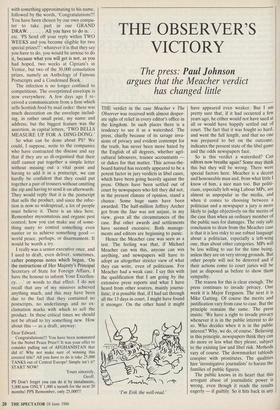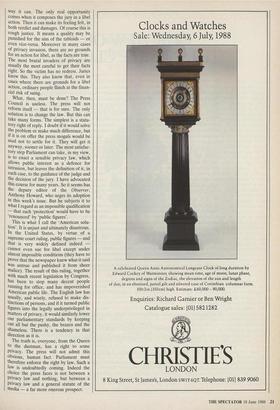THE OBSERVER'S VICTORY
The press: Paul Johnson argues that the Meacher verdict has changed little
THE verdict in the case Meacher v The Observer was received with almost desper- ate sighs of relief in every editor's office in the kingdom. In such places there is a tendency to see it as a watershed. The press, chiefly because of its savage inva- sions of privacy and evident contempt for the truth, has never been more hated by the English of all degrees, whether agri- cultural labourers, trainee accountants or dukes for that matter. This across-the- board hatred has recently appeared to be a potent factor in jury verdicts in libel cases, which have been going heavily against the press. Others have been settled out of court by newspapers who felt they did not, in the present climate of opinion, stand a chance. Some huge sums have been awarded. The half-million Jeffrey Archer got from the Star was not unjust, in my view, given all the circumstances of the case. But other awards and settlements have seemed excessive. Both manage- ments and editors are beginning to panic.
Hence the Meacher case was seen as a test. The feeling was that, if Michael Meacher can win this, anyone can win anything, and newspapers will have to adopt an altogether stricter view of what they can write, even of politicians. For Meacher had a weak case. I say this with the qualification that I am going by the extensive press reports and what I have heard from other sources, mainly journa- listic; it is possible that, if I had sat through all the 13 days in court, I might have found it stronger. On the other hand it might Ttpt Erik the well-read.' have appeared even weaker. But I am pretty sure that, if it had occurred a few years ago, he either would not have sued at all or would have happily settled out of court. The fact that it was fought so hard, and went the full length, and that no one was prepared to bet on the outcome, indicates the present state of the libel game and the odds newspapers face.
So is this verdict a watershed? Can editors now breathe again? Some may think this but they will be wrong. There were special factors here. Meacher is a decent and honourable man and, from what little know of him, a nice man too. But politi- cians, especially left-wing Labour MPs, are almost as unpopular as the media, and when it comes to choosing between a politician and a newspaper a jury is more likely to judge objectively on the merits of the case than when an ordinary member of the public sues for damages. The only safe conclusion to draw from the Meacher case is that it is less risky to use robust language about a politician, especially a left-wing one, than about other categories. MPs will be less willing to sue for the time being, unless they are on very strong grounds. But other people will not be deterred and if their actions come to court juries will be just as disposed as before to show them sympathy.
The reason for this is clear enough. The press continues to invade privacy. One week it is Major Ferguson. The next it is Mike Gatting. Of course the merits and justification vary from case to case. But the principle remains the same. The press insists: 'We have a right to invade privacy whenever it is in the public interest to do so. Who decides when it is in the public interest? Why, we do, of course.' Believing in this principle, newspapers think they can do more or less what they please, subject to the existing law and libel risk. Methods vary of course. The downmarket tabloids conspire with prostitutes. The qualities hire 'investigative journalists' to harass the families of public figures.
The public knows in its heart that this arrogant abuse of journalistic power is wrong, even though it reads the results eagerly — if guiltily. So it hits back in any way it can. The only real opportunity comes when it composes the jury in a libel action. Then it can make its feeling felt, in both verdict and damages. Of course this is rough justice. It means a quality may be punished for the sins of the tabloids — or even vice-versa. Moreover in many cases of privacy invasion, there are no grounds for an action for libel, as the facts are true. The most brutal invaders of privacy are usually the most careful to get their facts right. So the victim has no redress. Juries know this. They also know that, even in cases where there are grounds for a libel action, ordinary people flinch at the finan- cial risk of suing.
What, then, must be done? The Press Council is useless. The press will not reform itself — that is for sure. The only solution is to change the law. But this can take many forms. The simplest is a statu- tory right of reply. I doubt if it would solve the problem or make much difference, but if it is on offer the press moguls would be mad not to settle for it. They will get it anyway, sooner or later. The most satisfac- tory step Parliament can take, in my view, is to enact a sensible privacy law, which allows public interest as a defence for intrusion, but leaves the definition of it, in each case, to the guidance of the judge and the decision of the jury. I have advocated this course for many years. So it seems has the deputy editor of the Observer, Anthony Howard, who urges its adoption in this week's issue. But he subjects it to what I regard as an impossible qualification — that such 'protection' would have to be `renounced' by 'public figures'.
This is what I call the `American solu- tion'. It is unjust and ultimately disastrous. In the United States, by virtue of a supreme court ruling, public figures — and that is very widely defined indeed cannot even sue for libel except under almost impossible conditions (they have to prove that the newspaper knew what it said was untrue and published it from sheer malice). The result of this ruling, together with much recent legislation by Congress, has been to stop many decent people running for office, and has impoverished American public life. The English law has usually, and wisely, refused to make dis- tinctions of persons, and if it turned public figures into the legally underprivileged in matters of privacy, it would similarly lower our parliamentary standards by keeping out all but the pushy, the brazen and the shameless. There is a tendency in that direction as it is.
The truth is, everyone, from the Queen to the dustman, has a right to some privacy. The press will not admit this obvious, human fact. Parliament must therefore enforce the right by law. Such a law is undoubtedly coming. Indeed the choice the press faces is not between a privacy law and nothing, but between a privacy law and a general statute of the media — a far more onerous prospect.



















































 Previous page
Previous page